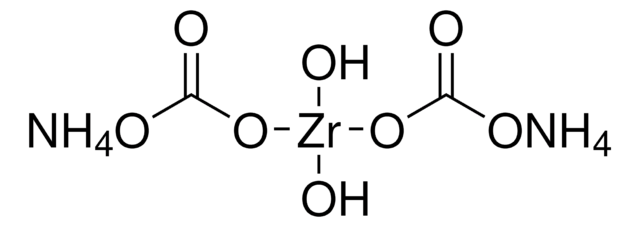771600
Zirconium(IV) dibutoxide(bis-2,4-pentanedionate) solution
25 wt. % (in 1-butanol/toluene), 99.9% trace metals basis
Synonym(s):
Bis(acetylacetonato)dibutoxyzirconium, Dibutoxybis(acetylacetonato)zirconium, Dibutoxyzirconium bis(acetylacetonate), Zirconium bis(n-butoxy) bis(acetoacetonate), Zirconium di-n-butoxide(bis-2,4-pentanedionate), Zirconium, dibutoxybis(2,4-pentanedionato), Zirconiumdibutoxide bis(2,4-pentanedionate), Zirconiumdibutoxybisacetylacetonate
About This Item
Recommended Products
Assay
99.9% trace metals basis
form
liquid
reaction suitability
core: zirconium
concentration
25 wt. % (in 1-butanol/toluene)
refractive index
n20/D 1.487
density
0.928 g/mL at 25 °C
SMILES string
CCCCO[Zr](OCCCC)(O\C(C)=C/C(C)=O)O\C(C)=C/C(C)=O
InChI
1S/2C5H8O2.2C4H9O.Zr/c2*1-4(6)3-5(2)7;2*1-2-3-4-5;/h2*3,6H,1-2H3;2*2-4H2,1H3;/q;;2*-1;+4/p-2/b2*4-3-;;;
InChI key
VKWRHWOICYRNLR-VGKOASNMSA-L
Application
Signal Word
Danger
Hazard Statements
Precautionary Statements
Hazard Classifications
Acute Tox. 4 Oral - Aquatic Chronic 3 - Asp. Tox. 1 - Eye Dam. 1 - Flam. Liq. 2 - Repr. 2 - Skin Irrit. 2 - STOT RE 2 - STOT SE 3
Target Organs
Central nervous system, Respiratory system
Storage Class Code
3 - Flammable liquids
WGK
WGK 3
Flash Point(F)
46.4 °F
Flash Point(C)
8 °C
Certificates of Analysis (COA)
Search for Certificates of Analysis (COA) by entering the products Lot/Batch Number. Lot and Batch Numbers can be found on a product’s label following the words ‘Lot’ or ‘Batch’.
Already Own This Product?
Find documentation for the products that you have recently purchased in the Document Library.
Articles
Nanomaterials are considered a route to the innovations required for large-scale implementation of renewable energy technologies in society to make our life sustainable.
Our team of scientists has experience in all areas of research including Life Science, Material Science, Chemical Synthesis, Chromatography, Analytical and many others.
Contact Technical Service











